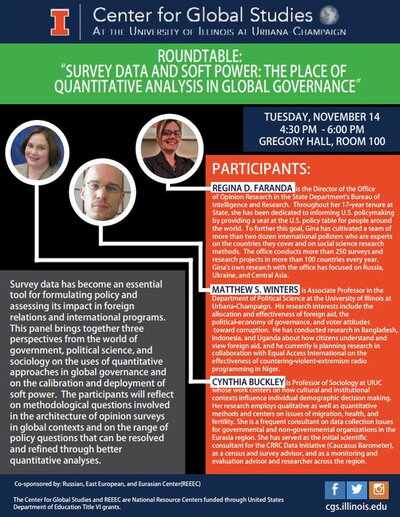
Survey data has become an essential tool for formulating policy and assessing its impact in foreign relations and international programs. This panel brings together three perspectives from the world of government, political science, and sociology on the uses of quantitative approaches in global governance and on the calibration and deployment of soft power. The participants will reflect on methodological questions involved in the architecture of opinion surveys in global contexts and on the range of policy questions that can be resolved and refined through better quantitative analyses.
[VIDEO]
Participants:
Regina Faranda is the Director of the Office of Opinion Research in the State Department’s Bureau of Intelligence and Research. Throughout her 17-year tenure at State, she has been dedicated to informing U.S. policymaking by providing a seat at the U.S. policy table for people around the world. To further this goal, Gina has cultivated a team of more than two dozen international pollsters who are experts on the countries they cover and on social science research methods. The office conducts more than 250 surveys and research projects in more than 100 countries every year. Gina’s own research with the office has focused on Russia, Ukraine, and Central Asia.
Matthew S. Winters is an Associate Professor in the Department of Political Science at the University of Illinois at Urbana-Champaign. His research interests include the allocation and effectiveness of foreign aid, the political economy of governance, and voter attitudes toward corruption. He has conducted research in Bangladesh, Indonesia, and Uganda about how citizens understand and view foreign aid, and he currently is planning research in collaboration with Equal Access International on the effectiveness of countering-violent- extremism radio programming in Niger.
Cynthia Buckley is a Professor of Sociology at UIUC whose work centers on how cultural and institutional contexts influence individual demographic decision making. Her research employs qualitative as well as quantitative methods and centers on issues of migration, health, and fertility. She is a frequent consultant on data collection issues for governmental and non-governmental organizations in the Eurasia region. She has served as the initial scientific consultant for the CRRC Data Initiative (now known as the Caucasus Barometer), as a census and survey advisor, and as a monitoring and evaluation advisor and researcher across the region.
